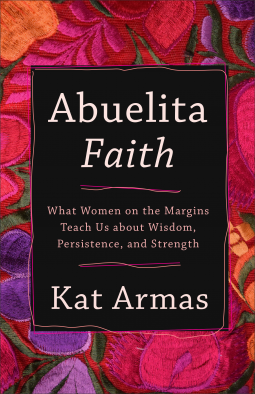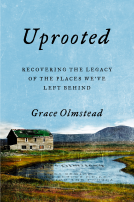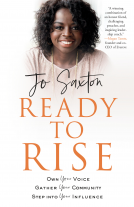
Abuelita Faith
What Women on the Margins Teach Us about Wisdom, Persistence, and Strength
by Kat Armas
This title was previously available on NetGalley and is now archived.
Send NetGalley books directly to your Kindle or Kindle app
1
To read on a Kindle or Kindle app, please add kindle@netgalley.com as an approved email address to receive files in your Amazon account. Click here for step-by-step instructions.
2
Also find your Kindle email address within your Amazon account, and enter it here.
Pub Date Aug 10 2021 | Archive Date Aug 31 2021
Baker Academic & Brazos Press | Brazos Press
Talking about this book? Use #AbuelitaFaith #NetGalley. More hashtag tips!
Description
Outreach 2022 Recommended Resource (Christian Living)
"[A] powerful debut. . . . This persuasive testament will appeal to Christians interested in the lesser-known women of the Bible."--Publishers Weekly
"Armas expertly weaves her own abuelita's history of personal faith and resistance into each chapter and intersects it with biblical text, creating an approachable work."--Library Journal
What if some of our greatest theologians wouldn't be considered theologians at all?
Kat Armas, a second-generation Cuban American, grew up on the outskirts of Miami's famed Little Havana neighborhood. Her earliest theological formation came from her grandmother, her abuelita, who fled Cuba during the height of political unrest and raised three children alone after her husband passed away. Combining personal storytelling with biblical reflection, Armas shows us how voices on the margins--those often dismissed, isolated, and oppressed because of their gender, socioeconomic status, or lack of education--have more to teach us about following God than we realize.
Abuelita Faith tells the story of unnamed and overlooked theologians in society and in the Bible--mothers, grandmothers, sisters, and daughters--whose survival, strength, resistance, and persistence teach us the true power of faith and love. The author's exploration of abuelita theology will help people of all cultural and ethnic backgrounds reflect on the abuelitas in their lives and ministries and on ways they can live out abuelita faith every day.
Advance Praise
“With this stunning debut, Kat Armas makes her mark as one of the most brilliant biblical scholars of her generation. Using her own family’s stories and those of overlooked abuelitas in Scripture, Armas takes her readers on a theological tour of the Bible. Because she is an excellent tour guide, she encourages readers to look beyond the obvious and see the wisdom, prophetic truth, and insight these abuelitas offer. Her beautiful and accessible prose brims with hope as she advocates for the marginalized and oppressed women in the biblical text with nuanced and original interpretations. With biblical expertise and sanctified imagination, Armas invites readers to see what la Espíritu Santa has shown her in Scripture and to be transformed by reading the Bible with her. In Abuelita Faith readers will encounter the liberative power of wrestling with the biblical text while they plumb the depths of the riches of Latinas’ wisdom traditions. I am deeply grateful for all the ways Armas has offered me gentle encouragement to see my ancestresses anew—her voice is an important one for our time.”—Karen González, theologian, immigration advocate, and author of The God Who Sees
“Abuelita Faith is a celebration of women as genuine sources of theology. Leading from her own experience as the daughter of Cuban immigrants, Kat Armas shows us how the personal and biblical narratives of everyday women are essential to our journeys toward living unfragmented realities of life and faith. This is a book for churches, seminaries, men, and women.”—Michelle Ami Reyes, vice president, Asian American Christian Collaborative; author of Becoming All Things: How Small Changes Lead to Lasting Connections across Cultures
“Reading Abuelita Faith is like feasting on a faith prepared by generations. Through incisive cultural commentary, beautifully written memories of family, and the retelling of biblical narratives, Armas invites us into a faith that is relational and embodied. She reminds us that theology can be lived, not just theorized by those with the most social power, and that it’s happening precisely in the places where we have been told not to look.”—Hillary L. McBride, psychologist, author, speaker, podcaster
“Kat Armas’s Abuelita Faith is a tour de force. She immediately and boldly draws us into her abuela’s magnetic and wise Cuban embrace while opening up an intimate universe of courageous, faith-filled women inside the biblical narrative and beyond. As Armas tells of her own personal and communal formation under her abuela’s gutsy, loving, and resistant spiritual life, she also carefully analyzes Scripture and evokes a tantalizing humanness in communion with God, family, and the world. Abuelita Faith is not an abstraction, an ideal, or an ideology; it’s a challenging witness to a vigorously embodied hope.”—Mark Labberton, president, Fuller Theological Seminary
“Armas invites us as guests to attend the weekly game of dominoes, sit with her family, hear their stories, and make and create together with familia. She weaves together the wisdom of her ancestors with the stories of women in Scripture, providing insights into how to survive and thrive in one’s faith. Pastors, educators, and those trying to make sense of their own story in light of the biblical story need this book. It will help people undo and heal from generations of patriarchy and envision a faith community that values and is guided by the wisdom, knowledge, and leadership of women.”—Patrick B. Reyes, award-winning Chicano author of The Purpose Gap and Nobody Cries When We Die
“Abuelita Faith does something few writings are able to do for us. It gives us back our memories of God in the places that matter the most: our homes and bodies. Thinking, sensing, doing, and loving in the name of God have become white, male, rational, normative operations in the Western space. But Armas has found God operating powerfully in the underside of academia, the church, and the city—that is, at home, through the wisdom and practice of mujeres luchadoras (women in the struggle) and life givers, true teachers of the Spirit. Armas candidly and easily combines the best of postcolonial theories with biblically informed and ethically reconstructive approaches to everyday life. A must-read for those of us wishing for a different way of doing theology and faith.”—Oscar García-Johnson, associate professor of theology and Latinx studies, Fuller Theological Seminary; author of Spirit Outside the Gate: Decolonial Pneumatologies of the American Global South
“Abuelita Faith offers a master class for those seeking liberation at the intersection of their own stories and Scripture. Many books explore theology, but very few offer such an expansive picture of God told through the eyes and stories of overlooked people. This book invites all of us to greater liberation through finding ourselves in God’s story—the story of our ancestors who showed up and made a way for us.”—Brandi Miller, host of the Reclaiming My Theology podcast
“Abuelita Faith is a tour-de-force debut. Armas brilliantly weaves together Scripture, theology, history, postcolonial and feminist scholarship, personal experience, and culture to demonstrate that powerful named and unnamed women, who through the quotidian have affected the outcome of history, fill not only the Bible but also our lives. These women, including our abuelitas and other mentors, are theologians, teachers, and activists who embody the wise and loving way of Christ. It is at our peril if we fail to embrace them and give them due honor. Overlooking and underappreciating them impoverishes us and the world. Abuelita Faith is compelling, sharp, inspiring. Let us sit at Armas’s feet that we might gain the wisdom we so desperately need to embody abuelita faith ourselves. I anxiously look forward to reading whatever else she publishes!”—Marlena Graves, author of The Way Up Is Down: Becoming Yourself by Forgetting Yourself and 40 Days on Being a Nine: Enneagram Daily Reflections
“Abuelita Faith is perfectly named. Armas presents the undeniably traumatic history of the spirituality of marginalized women in a tender invitation as gentle as a grandmother setting a table. Like all good food, this book is meant to nourish—not only to open us to the lived experience of ‘others’ but to find in their witness a sustaining grace. Armas’s delicate blend of history, experience, theology, and Scripture offers a rich meal that feeds our decolonization and reconstruction of Christian faith long after the last plate.”—Emmy Kegler, author of One Coin Found: How God’s Love Stretches to the Margins and All Who Are Weary: Easing the Burden on the Walk with Mental Illness
Available Editions
| EDITION | Other Format |
| ISBN | 9781587435089 |
| PRICE | $19.99 (USD) |
| PAGES | 224 |
Average rating from 12 members
Featured Reviews
 Media/Journalist 145584
Media/Journalist 145584
After years of formal seminary education, Kat Armas found that one theologian emerged as the most impactful in her life: her abuelita. Armas, host of “The Protagonistas” podcast, realized there were voices she wasn’t hearing in the church and academia — those from the madres of the faith who had raised, shaped and formed her as a Cuban American. In “Abuelita Faith: What Women on the Margins Teach Us About Wisdom, Persistence, and Strength,” releasing in August, Armas encourages readers to see the overlooked women in their lives — particularly Black, Indigenous and other women of color — as genuine sources of theology.
Read the rest of our coverage at Religion News Service at the link below. https://religionnews.com/2021/04/01/10-nonfiction-books-and-one-novel-to-keep-womens-history-month-going-all-year/
I loved this book. The way Armas has interwoven her own story and the stories of her abuela and other marginalized women with the stories of women in Scripture is enlightening and eye-opening. Abuelita Faith reminds us, especially those of us who are white in the West, that theology is being done on the ground in communities all around us and it's just as true and just as powerful (and sometimes more so) as the theology being done in the academy or from the pulpits of our churches. It points us to the need to widen our perspective, to decolonize our ways of thinking about the world and our faith. Armas has given her reader a powerful exploration of the absolutely vital fact that if the Gospel we're preaching isn't actually good news for those on the margins, for the poor single mother, for the widow, for the struggling immigrant, then it's not truly the Gospel.
This was a fascinating look at the author’s experience of deconstructing and decolonising her faith. Drawing on liberation, mujerista, feminist, womanist and other branches of theology, she weaves in her own and her family’s stories with those from Latin American history and lesser known biblical texts. She recounts her struggles and her challenges honestly, and emphasises the importance of culture and heritage to engaged faith.
I have read quite widely in feminist theology and a little in liberation theology, so it was really interesting to see this different perspective on both. I picked this up expecting a fluffy, feel-good reflection on faith and family, but this was so much better. It was powerful, deep and challenging. I loved that the Bible stories she picked were not the common ones but the marginalised characters who are often overlooked (including my best girl, Rizpah). I did not know a lot about Latin American history or politics so it was great to learn more about this region and the cultural elements related to faith and religion both within this area and for those, like Armas, with roots there.
Kat Armas has masterfully woven together her own story of faith with Scripture and theology, drawing on liberation theology as well as postcolonial, feminist, and womanist theology. The driving question she wants us all to consider is “What if some of our greatest theologians wouldn't be considered theologians at all?” Throughout this book, Armas tells the stories of the overlooked theologians in the Bible and in our world today. And they have so much to teach us.
“For centuries Scripture has been used and misused to justify atrocities across the globe, and as a Western, biblically educated Christian, my conviction is to offer tools so that others can read and reread it through life-giving lenses, as I believe liberation is central to God’s story.”
Like Kat, I believe liberation is central to God’s story.
I found this part to be particularly encouraging:
“Ada Maria Isasi-Díaz once said that “La vida es la lucha—the struggle is life.” She explains that for over half of her life, she thought her task was to struggle and then one day enjoy the fruits of her labor—“but above all I have realized that I can and should relish the struggle,” she says. “The struggle is my life; my dedication to the struggle is one of the main driving forces in my life.” Relishing the struggle involves recognizing God’s presence within it, realizing that the struggle is sacred. And while la lucha is a personal struggle for survival, it also marks our collective struggle for liberation.”
“As Aboriginal elder Lilla Watson articulates so beautifully: our liberation is bound together. And that too—our collective struggle—is holy.”
Kat Armas offers a winding and winning meditation on the innate theological wisdom of our abuelitas, our spiritual ancestors and mothers in the faith. She deftly intersperses decolonizing Biblical interpretations with examples from modern headlines and the histories of colonized people, especially in the Americas, as well as with touching, intimate stories of her own life as a Cuban-American Christian raised by her madre and her abuelita.
One trend throughout her writing put me off at first but won me over by the end. Armas has a penchant for wondering. So many of her sentences begin with the words "I wonder," "perhaps," "I think," or "what if." These landed, at first, like guesswork, not what one expects to find in a deeply researched theological treatise. Partway through the book, I realized Armas' gentler approach was almost certainly deliberate. She is asking us to wonder along with her, to embrace less combative and less imperialist ways of thinking and knowing. Her writing shines in the moments of tension, asking the questions and suggesting, but not imposing, answers. She asks us to join a conversation, to wonder along with her, to pull up a chair at her -- and every abuelita's -- table.
My only critique is that the first two chapters, while providing a sound introduction to what Armas means by "abuelita theology," felt too lengthy and wandering. By chapter three, where she really dives headfirst into analysis and storytelling, Armas hits her stride and the book is more tightly written and compelling.
 Lisa B, Reviewer
Lisa B, Reviewer
Kat Armas invites us to celebrate the women who go before us--our mothers and grandmothers and aunts and mentors--and learn about theology through their lives.
As a second-generation Cuban American, Armas draws on her rich experiences of both her Cuban culture from her family and her own American culture. In this book she weaves stories and life lessons from these experiences plus from stories of women in the Old and New Testaments of the Bible.
"Liberation theology has taught me that theology cannot be divorced from personal story. Story is what connects theory with reality, what gives life to our religious understandings."
Armas reminds us that we need each of us to learn more about God.
"There have always been wise women, and even though many of them go unnamed in Scripture, my hope is that they would not go unnoticed any longer, that their wisdom would be celebrated."
My thanks to NetGalley + Baker Academic & Brazos Press for the review copy of this book.
Readers who liked this book also liked:
Catherine Mack
General Fiction (Adult), Mystery & Thrillers


















